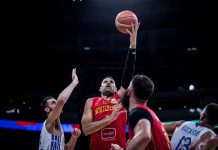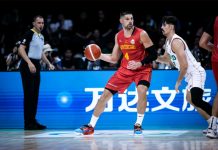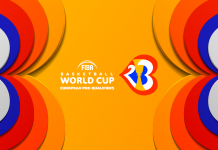The mastermind of Montenegro’s spectacular sweep in the EuroBasket 2013 qualifying campaign speaks at length to TalkBasket.net about the coming tournament.
For Montenegrin basketball fans Alytus translates from Lithuanian as heartbreak. Two years ago, their hopes were crushed in this tiny southern Lithuanian town as Dejan Radonjic’s squad placed last in pool play. Four defeats in five games anchored Montenegro to the bottom of the group and its early exit from the tournament expectedly triggered a head-coaching change.
Enter Luka Pavicevic. Early in his playing career he was remembered for being part of the talent-packed Yugoslav team that won the 1987 World Championship for Junior Men, defeating in the final a U.S. squad that featured future NBA champion Gary Payton and two-time NBA All Star Larry Johnson. Playing alongside Toni Kukoc, Dino Radja and Dusko Ivanovic at Jugoplastika/POP 84, Pavicevic went on to win three successive Euroleague titles in 1989-1991, the feat no club has repeated since. In 2003, he retired at 35 and started a coaching career, winning four trophies so far: the German League and Cup in 2008 and 2009 respectively with Alba Berlin, the gold medal at 2011 Universiade with Serbia and the bronze medal at 2005 U-20 EuroBasket with Serbia and Montenegro.
In late 2011, he took over France’s Chorale Roanne Basket, and has since coached both club and country. With Pavicevic in charge Montenegro posted an impeccable 10-0 record in last year’s EuroBasket qualifiers, earning an automatic berth in Slovenia! The winning streak included tough wins in Belgrade and Tel Aviv that whetted the fans’ appetite. Speaking to TalkBasket by telephone Saturday from the Montenegrin team’s base in Bar on the Adriatic coast, Pavicevic played down euphoric expectations, insisting that his players need to make the most out of the three starting encounters with direct rivals for third spot in the group – Macedonia, Latvia and Bosnia and Herzegovina. If they succeed, Montenegro will clinch the second round and banish painful Alytus memories for good.
Q. Montenegro’s preparation for EuroBasket is almost over. Without attaching too much importance to your team’s results during the two-month prep period, how content are you with the work done? Did everything go according to plan?
PAVICEVIC: All the players had arrived in training camp highly motivated, ready to sacrifice their summer, to spend energy and effort in order to improve as a team and represent our country at EuroBasket in the best way. However, we encountered difficulties almost immediately, lacking some of the players who were part of our team in the EuroBasket qualifying campaign last year: Vladimir Dragicevic [PF] decided to skip EuroBasket due to private reasons, and Blagota Sekulic [C] and Milko Bjelica [PF/C] arrived with chronic injuries – Achilles tendon and knee respectively – and their teams’ doctors recommended that they refrain from running drills until Aug. 1. Moreover, both had finished the previous season relatively early.
Q. Initially, your preliminary roster featured Montenegro’s both NBA centers, but eventually only one of them joined the squad.
PAVICEVIC: When we opened training camp, Nikola Pekovic’s contract situation was still unclear. Eventually, he signed a new deal [with the Minnesota Timberwolves] too late and we lost him. On the other hand, Orlando Magic’s Nikola Vucevic couldn’t join us before Aug. 1 – three-and-a-half months after playing his last competitive game – due to NBA regulations on player eligibility for FIBA tournaments. Adding to our mishaps, Marko Todorovic, the 21-year-old Barcelona center who grabbed attention last season, was grounded by injury. He was recovering well after the June surgery to correct the fracture of his right index finger, but later medical tests revealed an abdominal muscle injury that he’d apparently played with throughout last season.
Q. All these circumstances apparently reduced your frontcourt “firepower”, didn’t they?
PAVICEVIC: On Day 1 of our training camp we had only Vladimir Dasic [PF] who missed almost the entire last season and Bojan Dubljevic [C] available in the paint, so we added some younger players to help structure the game before Sekulic, Bjelica and Vucevic could join us. We were aware that we’d have players on the roster in different shape, both physically and tactics-wise, but we still made a conscious decision to play strong opponents in the run-up to EuroBasket. We may have not been able to fight all of them on a par, but we knew it was the only way for this team to make progress. We had three preparatory cycles and after completing each of them we were returning to our camp in Bar. Here we analyzed our errors and and tried to correct them in order to improve our form and ultimately accomplish the team’s goal in Slovenia – clinch the second phase.
Q. Montenegro lost its last three warmup games against Croatia, Italy and Slovenia. These games have apparently given you plenty of food for thought. What did you work on the most in the closing days of preparation, what did you seek to improve?
PAVICEVIC: Our focus was on defense. Due to injuries and late arrivals that I already mentioned, we didn’t have enough time to fine-tune our defense – we lacked coherence and the players who joined later were in different shape. Consequently, in pre-tournament friendlies we weren’t able to maintain the same level of defensive toughness and aggressiveness from start to finish, and we need that in order to win games in Slovenia. We’ve tried to fix that focusing on the most important aspects: transition defense, pressure on the ball, pick and roll defense which often exposed our lack of concentration when switching and we just couldn’t keep it up for 40 minutes. These mistakes cost us games. Offensively, the players who hadn’t been with us from the start lacked a bit of speed and accuracy in execution, so we worked on improving the ball movement and fluidity of our offense against varied types of defense.
Q. How far do you think this team can go in Slovenia? Can it compete for one of the 2014 World Cup berths?
PAVICEVIC: We need to be realistic. Based on the quality of organization, coaching staff and available players, I think that Spain, France and Lithuania are top contenders and way above all other teams at this tournament. Serbia, with its coaching staff and a seemingly endless source of young, talented players, is also able to perform at the highest level, as is the host nation, Slovenia, which also boasts excellent organizational capabilities, is well coached and has talent. Turkey and Greece rightly aspire to reach that level as the tournament progresses. There is a tiny question mark on Russia, because of the recent turbulences there, coaching changes and a few players deciding not to come. However, Russia is still the team that possesses the kind of talent and quality of a medal contender. Then there is Croatia – one of the most talented squads led by one of the best coaches. Finally, add Italy, the team that bears the stamp of Simone Pianigiani’s excellent work, and is unbelievably coherent. Italy’s able to break into this pool of medal contenders, which features 10 squads. Their quality level differs in nuances, they can basically be broken down into three echelons, but each of these teams has a chance to claim the podium. However, none is guaranteed a medal since there are 10 contenders for only three spots.
And then there are teams like Macedonia, Bosnia and Herzegovina, Germany, Poland, Finland… That’s the group we belong to. These are all well organized teams with good coaching staffs. They may lack the player talent possessed by the top 10 squads, but if they piece the puzzle they can beat not only each other, but upset favorites, too. Looking at things realistically, Montenegro has to put up a fight and try to advance to the second phase. If we manage to do that, we’ll continue striving to do even better and go as far as possible, but it would not be realistic for Montenegro and teams alike to set medal or World Cup goals by all means. I prepare my players to start every game with the kind of mindset that they can beat any opponent, including stronger teams – provided we have a great desire to win and approach the game properly.
Q. After the recent Adecco Cup in Slovenia you said that Montenegro’s bid to advance to the second round would chiefly depend on its performance against Bosnia and Herzegovina, Latvia and Macedonia, as Serbia and Lithuania are in a class of their own. Two years ago, Macedonia’s improbable run proved that smaller teams can step out of the shadow and upset giants. Do you really find Lithuania and Serbia impossible to beat?
PAVICEVIC: I’d like to be understood within the context of today’s reality. In our group Lithuania specifically and Serbia have the greatest coaching names, the greatest players. Besides that, we’re talking about the two schools of basketball – if we consider Serbia as successor to Yugoslavian school – that have been dominating in Europe for decades. They have solid fundamentals, they’ve put a lot of effort into their preparation and they currently play at the highest level. We need to focus on our first three games, which we can realistically win. Last summer we proved we could beat Serbia even twice, but it would not have been realistic to go into those games expecting wins from the outset. A year ago Serbia may have been in a different situation, with a different approach and it actually started later than we did.
Today, we can see that Serbia has done excellent prep work, found a way to merge new and old players under Duda Ivkovic’s guidance. Lithuania brings one of the strongest squads led by a coach who’s already accomplished great results with the national team and it would be a totally wrong approach if we tried to advance to the next round via these opponents. It’s feasible, though, if we focus on Macedonia, Latvia and Bosnia and Herzegovina, the teams that possess more or less the same quality, have the same ambitions as we do, and share similar basketball history trying to establish themselves in the new European basketball order. We’ll be playing these teams back-to-back in our first three games, and the two-month preparation eventually winds down to a three-day mini tournament that we’ll try to win and grab a spot in the second phase. This is a very tough group that had been made even tougher when Serbia – which placed third in the qualifying, but is among five or six strongest teams in Europe – was drawn into it from the sixth pot. If we had another team from the sixth pot, let’s say, the Czech Republic or Sweden, this group would have been completely different.
Q. Despite Pekovic’s absence, many observers still point out Montenegro’s strength in the paint, adding that one of the major drawbacks of your team is the lack of balance of quality between frontcourt and backcourt. How do you address that issue?
PAVICEVIC: The story about a small country producing NBA centers and posting a 10-0 record in qualifiers definitely grabs attention. However, observers talk about the strength of our frontcourt based on Pekovic and Vucevic who didn’t play the qualifiers and their participation in Slovenia was under a question mark, too. Ultimately, we managed to bring in Vucevic who finished last season in April and joined us in August. Furthermore, in the last two or three years Dasic hasn’t been consistent playing abroad and that culminated last season when he signed with Besiktas, eventually becoming their third choice at power forward. His minutes were scarce and he left the club in December, missing the greater part of the season. With Bojan Dubljevic as a rotation player at Valencia, Milko Bjelica in a backup role at Laboral Kutxa and Blagota Sekulic being an important part at CB Canarias, I would say we still have a solid frontcourt, but we are not dominant over other teams.
It is true, though, that our frontcourt and backcourt aren’t evenly balanced. Last year, we completely changed our backcourt and parted with Omar Cook, Goran Jeretin, Boris Bakic, Milos Borisov and Vlado Scepanovic. We even moved Dasic from small forward to power forward. In other words, we replaced all the backcourt players who’d been in the national team since its founding*. We brought in U.S. point guard Taylor Rochestie, and recently added another American playmaker, Tyrese Rice. We also introduced 18-year-old Nikola Ivanovic as backup point guard. At shooting guard and small forward we selected speedy, energetic players such as the Sehovic brothers, Suad and Sead, Aleksa Popovic, Marko Popovic… They have a lot of energy and they are ambitious, it’s a good group of players, but they’re not yet on a par with our frontcourt. I don’t think, though, that we should pay extra attention to this issue – the lack of balance is our reality and we should focus on finding the kind of game that would fit the best this blend of players. We need to play the kind of defense that fits our abilities and run an offense based on fluid ball movement and smart shot creation so we can make up for a certain lack of creativity.
Q. As a former point guard how would you rate the input of naturalized playmaker Taylor Rochestie and why did you ultimately select Tyrese Rice over him for this campaign?
PAVICEVIC: Since Montenegro has a shortage of top-class point guards, it stands to reason that in the coming four to six years, maybe even 10, we’ll be needing a foreign playmaker to fill that position. Relying on only one point guard is a bit risky as an unexpected injury might hurt our performance. In the qualifying it would have been too costly as we couldn’t afford to miss EuroBasket. On the other hand, despite being offered a European passport and despite being a responsible athlete, an American point guard can hardly be motivated to play as long as five, six or seven years for his adopted country. In my opinion, enthusiasm and aggressiveness of such players lasts no longer than two or three years, and in some exceptional cases – four. That is why Montenegro should approach the issue of recruiting U.S. point guards through three- or four-year rotation plans. In a way it reminds me of scouting policies in NCAA where a complete squad change occurs every three or four years. That is why we had decided to always rely on a pair of good point guards who in return obtain our citizenship, which may be helpful in their European careers. By doing this we add quality and depth at point guard, and if something unexpected happens we always have the backup option to reduce the risk of starting a new campaign without a top-rate playmaker.
Both Rochestie and Rice are terrific guys and classy playmakers, with only minor differences in their skillsets. We looked at those differences bearing in mind the point guards we’ll be facing in the key games in Slovenia: Macedonia’s Bo McCalebb, Bosnia and Herzegovina’s Zack Wright and Latvia’s Janis Strelnieks, and finally decided to hand the role to Rice. I had originally thought that Rochestie deserved that spot after doing a terrific job for us in the qualifying campaign last summer. However, after two months of training camp and following my conversations with both of them I made the decision, which at this point I think is right for Montenegro. On Friday we parted with Taylor who will now build his club career at Montepaschi.
Q. You’ve been working in France for more than a year now. The 2011 EuroBasket runner-up arrives in Slovenia as one of the favorites to win it all. Do you think they can go a step further than last time in Kaunas and dethrone Spain?
PAVICEVIC: I think it’s quite realistic, especially if we take into account that Spain is missing Pau Gasol and Juan Carlos Navarro. Spain is still an exceptionally strong opponent, but they lack two very important players. France has great continuity and is a huge source of talent, incessantly producing new players. I know well Vincent Collet through his work at Strasbourg, we compete in the same league. The French Basketball Federation is a top-level organization, they have a very strong coach in Collet and their squad led by Tony Parker is one of the most talented and definitely the most athletic of all. France has huge potential and alongside Lithuania and Spain is the chief favorite to win the tournament.
Q. Who on the Montenegro team could become a new European star in Slovenia?
PAVICEVIC: I don’t want to single out anyone before the tournament. Our main strength at this point is our team work and if we play at a high level as a team, there will certainly be individual performances to remember. But we need to stay together and focus on our effort as a group.
*Montenegro became the 213th FIBA member in September 2006, four months after voting to become an independent nation.
















